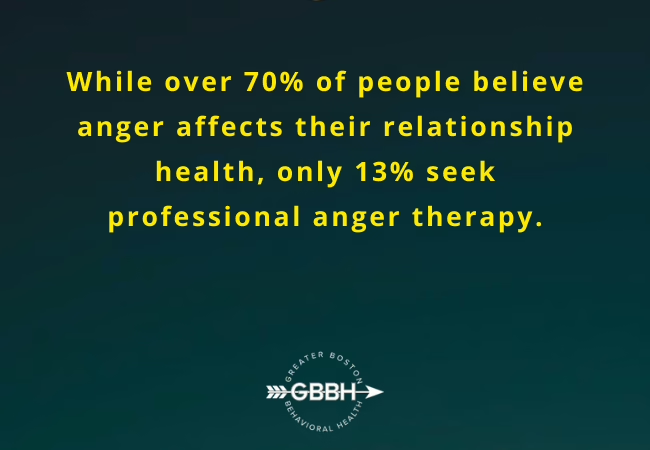Anger is a human emotion—one that can arise from frustration, hurt, stress, or fear. In small doses and expressed healthily, anger can be productive. It can set boundaries, reveal our values, and push us to seek change. But when anger becomes frequent, intense, or uncontrollable, it can take a serious toll on relationships.
If your anger—or your partner’s—has created a rift in your connection, therapy can help. Anger Management Therapy in Boston, offered at Greater Boston Behavioral Health, provides individuals and couples with the tools to regulate emotional reactions, communicate more effectively, and repair trust. It’s not just about “controlling your temper.” It’s about understanding what’s beneath the anger and learning to relate to others from a place of clarity, not chaos.
This blog will take a deep dive into how anger impacts relationships, how therapy supports healing, and how our Mental Health Programs in Boston offer tailored support for individuals and couples navigating emotional conflict.
How Anger Impacts Relationships
Anger can show up in relationships in many forms, including:
- Explosive arguments or recurring conflict
- Verbal or emotional abuse, including yelling, blaming, and name-calling
- Passive-aggressive behavior, like silent treatment or sarcasm
- Emotional withdrawal, avoidance, or shutting down
- Physical intimidation or, in some cases, aggression
- Controlling or manipulative patterns
Over time, these behaviors:
- Diminish trust and intimacy
- Make communication feel unsafe
- Increase anxiety, resentment, or emotional distancing
- Damage children’s emotional health when they witness conflict
- Fuel a cycle of guilt, shame, and further anger
Even when the anger is not directed at others, the emotional tension it creates can build walls between partners, siblings, coworkers, and friends. Fortunately, these patterns can be changed—and anger management therapy is one of the most effective tools to make that happen.
The Link Between Anger and Relationship Challenges
Unmanaged anger can take many forms in relationships. Some of the most common include:
-
Yelling, shouting, or verbal abuse
-
Passive-aggressive behavior
-
Emotional shutdown or stonewalling
-
Controlling or manipulative tendencies
-
Explosive reactions to minor frustrations
-
Physical aggression or intimidation
Even if the anger isn’t outwardly abusive, frequent irritation, tension, or emotional withdrawal can create an unsafe or unstable dynamic in any relationship.
Anger doesn’t just affect your partner or family—it affects your ability to feel emotionally secure, to be vulnerable, and to express needs clearly. When anger becomes the default mode of expression, it overshadows empathy, curiosity, and connection.
How Anger Management Therapy Can Help Heal Relationships
At Greater Boston Behavioral Health, we offer a range of Mental Health Programs in Boston that include specialized anger management therapy. Whether you’re in a relationship impacted by chronic conflict or you’re noticing your anger affect multiple areas of your life, our clinicians work with you to:
1. Understand the Root Causes of Anger
Many people assume anger is the problem, when in fact it’s a symptom of deeper emotional distress. Common roots of anger include:
- Childhood trauma or abuse
- Unresolved grief or loss
- Chronic stress or work burnout
- Anxiety, depression, or PTSD
- Feelings of powerlessness, insecurity, or rejection
Through therapy, clients begin to unpack these issues. When you understand what’s fueling your anger, it becomes easier to express your emotions without exploding or withdrawing.
2. Learn to Communicate Without Aggression
Relationships thrive on clear, respectful communication. Unfortunately, when anger dominates the dynamic, communication often becomes a battle. Therapy teaches clients how to:
- Use “I” statements instead of blame (“I feel hurt” vs. “You never listen”)
- Listen without interrupting or becoming defensive
- Stay present during conflict instead of shutting down
- Express needs directly without hostility or guilt
These skills are practiced in therapy—both individually and in group settings—so they become part of your emotional toolkit in real life.
3. Break the Cycle of Reactivity and Regret
A common pattern in anger-driven relationships is: Trigger → Outburst → Regret → Apology → Repeat
Anger management therapy helps break this cycle by:
- Identifying personal triggers
- Learning to recognize early signs of escalation
- Practicing de-escalation techniques like grounding, deep breathing, or timeouts
- Replacing reactive behavior with intentional, healthy responses
Over time, clients develop the emotional muscle to pause before reacting, choose how they respond, and create space for connection instead of conflict.
4. Develop Emotional Regulation and Self-Awareness
You can’t change what you don’t understand. Therapy helps clients recognize:
- The emotional patterns they’ve learned over time (e.g., anger as a defense)
- The role of emotional intensity in past relationships
- How their body responds when anger rises (tight chest, clenched jaw, racing heart)
- How to self-soothe and regulate emotional overload
These insights build the foundation for calmer, more respectful communication and less reactive conflict.
5. Rebuild Trust and Repair Emotional Safety
In relationships damaged by anger, trust takes time to rebuild. Through therapy, clients learn how to:
- Acknowledge past harm without defensiveness
- Apologize and make amends with sincerity
- Show up consistently with changed behavior
- Reestablish emotional safety and create a new foundation for connection
In some cases, couples therapy may also be recommended as a supplement to individual anger management work. We incorporate relationship support into many of our Mental Health Programs in Boston to ensure all parties feel seen and supported.
Who Can Benefit from Anger Therapy for Relationship Issues?
Anger management therapy is helpful for:
- Individuals struggling with short tempers, explosive arguments, or passive-aggressive behavior
- Partners who want to understand and support someone with anger challenges
- Parents who find themselves yelling or becoming irritable with their children
- Professionals whose anger affects work relationships
- Individuals with past trauma or mood disorders whose anger impacts their current relationships
We provide treatment across the spectrum—from brief outpatient therapy to Residential Treatment Programs in Boston—to meet the unique needs of each client.
Integrated Care That Supports Relationship Healing
At Greater Boston Behavioral Health, we know that healing takes more than just talking. That’s why we offer multiple levels of care, each with customized programming that includes anger management therapy:
Outpatient Therapy
Weekly sessions with a licensed therapist to work on emotional regulation, communication, and relationship skills.
Intensive Outpatient Program in Boston (IOP)
Structured programming several days per week with group therapy, individual sessions, and skills development—perfect for individuals needing consistent support while maintaining daily responsibilities.
Partial Hospitalization Program in Boston (PHP)
Full-day therapeutic care 5 days per week for clients experiencing intense emotional dysregulation or relational distress. Includes trauma therapy, anger management, and psychiatric care.
Residential Treatment Program in Boston
Live-in treatment for individuals with long-standing anger or relational trauma. Ideal for clients who need immersive, round-the-clock support and space from triggering environments.
Inpatient Treatment Program in Boston
Short-term, intensive psychiatric care for clients in crisis. Focuses on stabilization before transitioning into PHP or IOP.
Psychiatric Care in Boston
Clients may receive medication evaluation and management to address co-occurring conditions like anxiety, depression, or mood disorders that may amplify anger and strain relationships.
Long-Term Benefits of Anger Management for Relationships
After completing treatment, clients often report:
- Fewer arguments and more peaceful conversations
- Better emotional control in moments of tension
- Increased intimacy and emotional safety
- Stronger self-esteem and relationship boundaries
- Deeper understanding of both self and partner
When anger is no longer running the show, empathy, respect, and connection take its place. And that changes everything.
When to Seek Help
You don’t have to wait until a relationship is at its breaking point. If any of the following are true, it may be time to explore anger management therapy:
- You often say things you regret during conflict
- Your loved ones feel afraid, distant, or emotionally exhausted
- You’ve noticed that anger affects your ability to connect
- You feel out of control or ashamed after angry episodes
- Past trauma or unresolved pain seems to fuel your reactions
- You’ve tried to manage it on your own but haven’t made lasting progress
The sooner you begin therapy, the more opportunities you have to rebuild trust and prevent further damage.
Conclusion
Anger doesn’t have to control your relationships. With the right support, you can understand your emotions, express yourself with confidence, and repair the relationships that matter most.
At Greater Boston Behavioral Health, we’re committed to walking with you through every step of that journey. Our expert team offers compassionate, customized Anger Management Therapy in Boston as part of our full range of Mental Health Programs in Boston. Whether you’re seeking outpatient therapy or residential support, we’re here to help you turn conflict into connection—and anger into growth. Call us today at (888) 278-0716 to schedule your confidential consultation.
FAQ on Anger Management and Relationships
Can anger really ruin a relationship?
Yes. Chronic anger can lead to conflict, emotional abuse, communication breakdowns, and loss of trust. Without intervention, it often damages relationships permanently.
How does therapy improve my relationship?
Therapy teaches you how to recognize your triggers, regulate emotional reactions, and communicate without aggression or avoidance. These skills promote respect and connection.
Is anger always the real issue?
Often, anger is a surface emotion masking deeper issues like fear, sadness, anxiety, or unresolved trauma. Therapy helps you identify and work through the root causes.
What if my partner isn’t in therapy—can I still improve things?
Yes. Change starts with you. Many clients find that improving their own emotional regulation positively influences their relationships—even if their partner isn’t in treatment.
What types of therapy help with anger in relationships?
We use CBT, DBT, mindfulness, trauma-informed care, and communication training across all levels of care—including outpatient, IOP, PHP, and residential treatment.
sbobet
slot gacor 4d
data macau
toto macau
panel idn
agen toto togel
link gacor
toto togel
idn togel
gacor4d login
slot gacor hari ini
slot gacor maxwin
pay4d login


